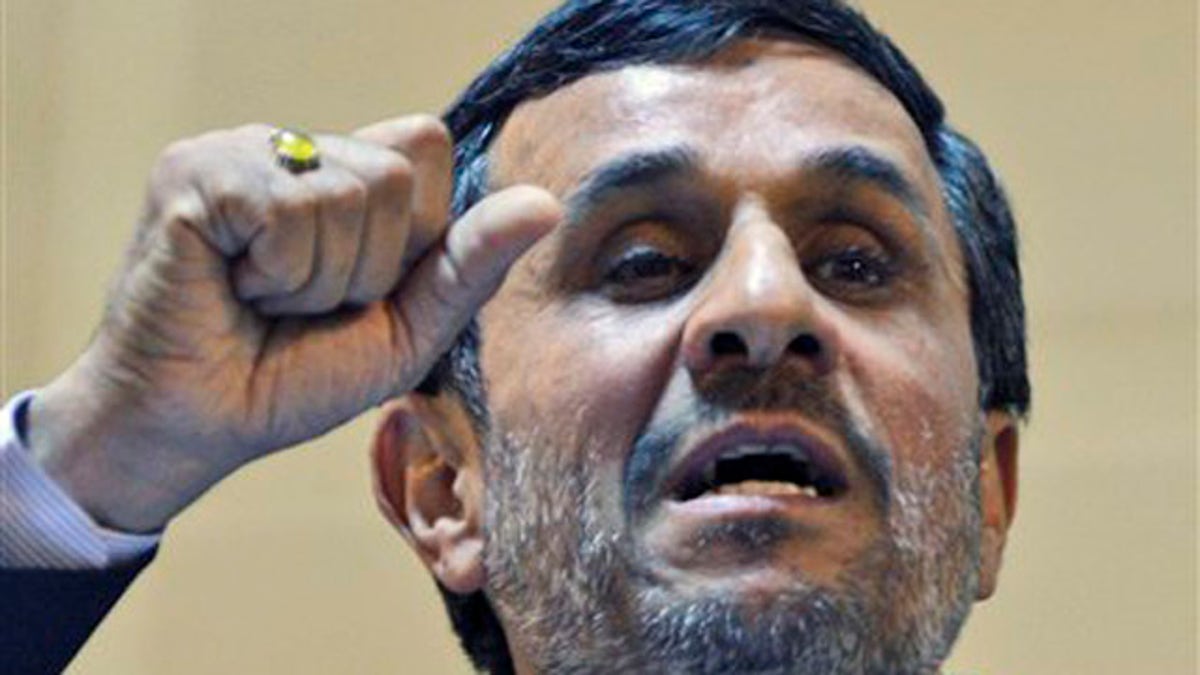
Iranian President Mahmoud Ahmadinejad gestures as he delivers a speech in Tehran, Iran, Oct. 2. (AP)
The U.S. government is implicating officials high up in Iran's special operations Quds Force over the alleged plot to assassinate the Saudi ambassador to Washington as the White House claims it will "take no options off the table" in dealing with Iran.
"It's a dangerous escalation of the Iranian government's longstanding use of violence ... We are committed to holding the Iranians accountable," White House Press Secretary Jay Carney said Wednesday.
For now, Carney said the Obama administration is focusing on pressuring Iran through economic sanctions and diplomatic coalition-building -- though he said no options are off the table.
President Obama spoke to King Abdullah of Saudi Arabia on Wednesday about the plot and they agreed it represents a "flagrant violation of fundamental international norms, ethics and law," the White House said in a statement.
"They also praised the work of intelligence and law enforcement agencies that led to the disruption of this plot, and reiterated the joint commitment on the part of the United States and Saudi Arabia to pursue a strong and unified international response that holds those responsible accountable for their actions," the White House said.
But emerging details suggest a potential strategy shift in Tehran's quest for influence in the Middle East could require a new level of vigilance.
Some have questioned whether the plot was crafted under the guidance of top-level Iranian leaders. The names dropped so far by the Obama administration are no small fish. Among the individuals sanctioned Tuesday by the Treasury Department for alleged ties to the plot were Quds Commander Qasem Soleimani and Abdul Reza Shahlai -- a Quds official notorious for his alleged role planning a 2007 attack which killed five American soldiers in Iraq.
A 2008 statement from the Treasury Department, announcing an earlier set of sanctions, had cited Shahlai for his role in planning the attack, as well as in helping supply weapons to and coordinate training for anti-U.S. groups in Iraq.
Shahlai's background underscores the kind of shift the latest plot could signify, if the information spilled by the lone suspect in custody is correct.
Whereas Iran had previously kept its international meddling to isolated attacks and coordination with militias in places like Iraq and Afghanistan, the attempted assassination would have been an unprecedented strike inside the United States aimed specifically at its dominant neighbor, Saudi Arabia.
Analysts said the plot shows how Iran is ratcheting up efforts to outflank the Kingdom as other nations in the region regroup following the Arab Spring.
"Together with Egypt, these are three countries that fervently believe that they should be the leaders of that region," said P.J. Crowley, former assistant secretary for public affairs at the State Department. He noted Egypt is "distracted" by its own political transition, leaving Saudi and Iran to duke it out.
"There is a definite connection in terms of the Arab Spring. How these transitions are playing out, it's raising the stakes for leadership in the region," he said on Fox News. "I think within that context, you see this plot between Iran and Saudi Arabia play out."
Crowley questioned whether the plot was a "rogue operation" by Quds-tied officials, or a "strategic decision" by top brass in Tehran to target Saudi Arabia "first and foremost."
Vice President Biden, in an interview on CBS' "Early Show," said it appears the perpetrators wanted to "punish the Saudi Kingdom."
KT McFarland, a former Defense official and Fox News national security analyst, said Wednesday that a plot against Saudi Arabia would point to another phase in the long-standing enmity between Iran's Shiite leaders and Saudi's Sunnis.
"What's brewing in the Persian Gulf is a fight of some sort between Iran and Saudi Arabia," she said. "Those tribes have been fighting each other for millennia and what you're seeing now is who's going to have dominance in the Gulf region."
Top U.S. officials described the plot as a threatening development. Secretary of State Hillary Clinton on Wednesday called it a "dangerous escalation" of Iran's terror sponsorship.
Sen. John McCain, R-Ariz., said he wasn't surprised, given Iran's past activities, ranging from support of Hezbollah and Hamas, U.S.-designated terror groups closely tied to the Iranian regime, to its nuclear program to the export of weapons into Afghanistan.
Still, some questioned the claims of high-level involvement, which seem to derive in large part from the confession of the lone suspect in custody, Manssor Arbabsiar.
According to the Justice Department, Arbabsiar said he was "recruited, funded and directed" by apparent senior Quds officials.
Two former senior intelligence officials said that something about the plot doesn't sit right, and that it seems to go against Iran's pattern. One questioned why the Iranians would have allegedly tried to work through a Mexican drug cartel, as the Justice Department claimed, rather than Hezbollah.
But John Bolton, former U.S. ambassador to the United Nations, said Iran may have taken the "seemingly incredible step" of going through a purported cartel representative so that they would leave "no fingerprints" on an attack that even by their standards would have been "very brazen."




